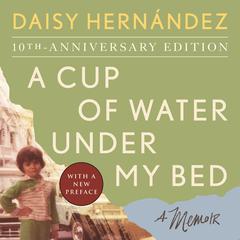 Play Audiobook Sample
Play Audiobook Sample
The Kissing Bug: A True Story of a Family, an Insect, and a Nation’s Neglect of a Deadly Disease Audiobook
 Play Audiobook Sample
Play Audiobook Sample
Quick Stats About this Audiobook
Total Audiobook Chapters:
Longest Chapter Length:
Shortest Chapter Length:
Average Chapter Length:
Audiobooks by this Author:
Publisher Description
Who does the United States take care of and who does it leave behind? This is a riveting investigation of infectious disease, poverty, racism, and for-profit health care—and the harm caused by decades of silence.
Growing up in a New Jersey factory town in the 1980s, Daisy Hernández believed that her aunt had become deathly ill from eating an apple. No one in her family, in either the United States or Colombia, spoke of infectious diseases, and even into her thirties, she only knew that her aunt had died of a rare illness called Chagas. But as Hernández dug deeper, she discovered that Chagas—or the kissing bug disease—is more prevalent in the United States than the Zika virus. Today, more than three hundred thousand Americans have Chagas.
Why do some infectious diseases make headlines and others fall by the wayside? After her aunt’s death, Hernández begins searching for answers about who our nation chooses to take care of and who we ignore. Crisscrossing the country, she interviews patients, epidemiologists, and even veterinarians with the Department of Defense. She learns that outside of Latin America, the United States is the only country with the native insects—the “kissing bugs”—that carry the Chagas parasite. She spends a night in southwest Texas hunting the dreaded bug with university researchers. She also gets to know patients, like a mother whose premature baby was born infected with the parasite, his heart already damaged. And she meets one cardiologist battling the disease in Los Angeles County with local volunteers.
The Kissing Bug tells the story of how poverty, racism, and public policies have conspired to keep this disease hidden—and how the disease intersects with Hernández’s own identity as a niece, sister, and daughter; a queer woman; a writer and researcher; and a citizen of a country that is only beginning to address the harms caused by Chagas and the dangers it poses. A riveting and nuanced investigation into racial politics and for-profit health care in the United States, The Kissing Bug reveals the intimate history of a marginalized disease and connects us to the lives at the center of it all.
Download and start listening now!
“Uncovers a story about the intersection of public health and discrimination and a disease that will become even more virulent as climate change stretches the kissing bug habitat further north.”
— Chicago Public Library
Quotes
-
“Raises questions on why a disease that kills tens of thousands a year is not more of a focus."
— NBC News -
“Part memoir, part investigative thriller…Her book shines a light on [a] neglected harm.”
— San Francisco Chronicle -
“A necessary read for anyone concerned about health crises across the world.”
— Boston Globe -
“Hernández expertly skates the line between memoir and science tome, showing the personal effects of a disease perpetuated by a cascade of systemic failures.”
— Washington Post -
“Narrator Frankie Corzo’s…blend of American and Latinx dialects perfectly conveys Hernandez’s bittersweet realization.”
— AudioFile -
“Hernández knows the impact of Chagas disease…and what that reveals about how we treat working-class people.”
— Bitch magazine -
“This vivid, multidimensional account brings an ongoing medical injustice to light.”
— Publishers Weekly (starred review) -
“A compelling indictment of our failing health care system and the people falling through its ever widening cracks.”
— Kirkus Reviews -
“[An] engrossing account.”
— Foreword Reviews -
“An absolutely essential perspective on global migration, poverty, and pandemics.”
— Amy Stewart, author of Wicked Bugs -
“The Kissing Bug is a deft mix of family archaeology, parasite detective story, and American reckoning. A much-needed addition to the canon.”
— Danielle Ofri, MD, PhD, author of When We Do Harm -
“Hernández writes to the heart of the story with immense tenderness, compassion, and intelligence. A riveting read.”
— Angie Cruz, author of Dominicana
Awards
-
A Newsweek Pick of Summer's Best Books
-
A BuzzFeed Books Pick of Best Books of Summer
-
A Chicago Public Library Staff Pick of Best Books of 2021
-
Longlisted for the PEN/Open Book Award
The Kissing Bug Listener Reviews
Be the first to write a review about this audiobook!
About Daisy Hernández
Daisy Hernández is a former reporter for the New York Times and has been writing about the intersections of race, immigration, class, and sexuality for almost two decades. She edited Colonize This! Young Women of Color on Today’s Feminism and Colorlines, a newsmagazine on race and politics. She has written for National Geographic, NPR’s All Things Considered, Code Switch, The Atlantic, Slate, and Guernica. She is the author of the award-winning memoir A Cup of Water under My Bed and is a professor at Miami University in Ohio.
About Frankie Corzo
Frankie Corzo is a film and voice-over actress and audiobook narrator. She obtained a BA degree in theater studies from Montclair State University.




